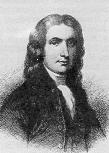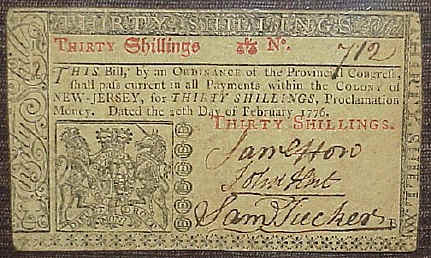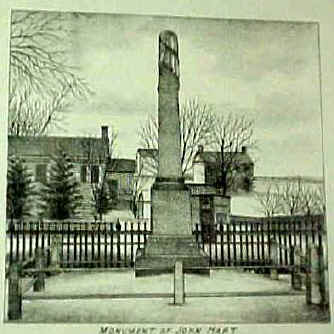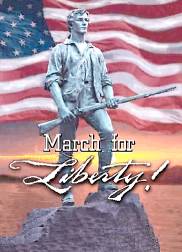 |
 |
The Articles of Confederation - 1777
The Constitution for the United States, Its Sources and Its Application
 |
JOHN HART
Signer Of
The Declaration Of Independence
for New Jersey
A Biography
One of the Revolutionary patriots who voluntarily incurred the greatest degree of suffering without any possibility of individual gain was John Hart. He was a farmer, known throughout his State as "Honest John Hart". Fellow Signer, Benjamin Rush, described him as "a plain, honest, well meaning Jersey farmer, with but little education, but with good sense and virtue enough to pursue the true interests of his country." He served with distinction in the pre-Revolutionary legislatures of New Jersey, and in 1765 was one of the first to recognize the tyrannical character of the iniquitous Stamp Act. During the enemy invasion of New Jersey Hart was besieged in his farmhouse. His wife lay dying at the time, and he refused to leave her. After her death he managed to make his escape, and for a year was hunted through the woods, where he existed as a common exile and fugitive, eluding every effort of his pursuers. An old man, at the time, he never lost his spirit, and joined Washington's army as a private after the battle of Princeton.
John Hart lived in Hopewell Township, in what is now the town of Hopewell, which was then known locally as Baptist Meeting House, for the church there. He was the son of Edward Hart, a Justice of the Peace, public assessor, and farmer. He was the grandson of John Hart, a carpenter who came to Hopewell from Newtown, Long Island.
Born in 1711, in Stonington, Connecticut, coming to New Jersey with his parents at an early age, John was taught to read, write and do figures, but like most men of his day, had little formal schooling. His spelling was poor, but at the time most people were casual about spelling, if they could read at all. He is said to have been a man of medium height and well proportioned, with very black hair and light eyes, and to have been called handsome in his youth. He was well known for his common sense, and may have been well read for his day, and at least later in life knew the law, and was considered informed on money and business matters.
In 1742, he and his father Edward together repurchased 100 acres of their own land. Edward had bought 50 acres years before, and they added 50 acres of Edward's brother John Jr's adjacent land. In a land title dispute that lasted many years and involved many people who had purchased land in the area, they were forced to repurchase the land from the estate of John Coxe, of the New Jersey proprietors, for 144 pounds, 13 shillings and 6 pence. The original price paid was 10 pounds per hundred acres.
In 1746, Edward was granted a warrant to assemble a company of militia to fight the French in Canada by the New Jersey provincal government. Unfortunately, when they arrived in Perth Amboy 6 weeks later, they were the 6th company of 5 agreed to by the government. Since at the time, the man assembling troops paid their expenses until taken by the government, this seemed a great loss to both Edward and his supporters in the government. The royal governor John Hamilton, considered the company "by far the most likely and able-bodied men that had been raised."
The Governor then recommended to the State of New York that New York take them as part of their allotment. He further set aside some of the outfitting money from the state for the militia, to feed the men while Captain Edward went to Albany to get approval. This was done, and the company went to Albany to await deployment.
Fifteen miserable months later the company was dismissed. The entire project of invading Canada at the time was a fiasco. Neither the Royal treasury, nor the Provinces wanted to foot the bills, and Capt. Edward spent his remaining years trying to recover his expenses. He died in 1752.
In 1739 John Hart married Deborah Scudder, daughter of Lt. Richard Scudder of Scudder's Falls.
Around 1739-1740 John bought the "homestead plantation" of 193 acres on the north side of what is now the town of Hopewell.
In 1747, he donated to the Baptists, who wanted to build a church in a convenient spot in the area, a parcel of ground for a church from his front meadow. He was a Presbyterian, and this endeared him to the Baptists in the area, who may have supported him later when he ran for office. Until well after the revolution, the area was thereafter called Baptist Meeting House.
In 1750, John Hart was elected Freeholder for Hunterdon County, the highest elective office in the county.
In 1751, he and his brother bought a mill that was known as Daniel Hart's Mill.
In 1755, he was named a Justice of the Peace, which made him a gentleman, and he was thereafter called John Hart, Esquire. A Justice acted in minor legal issues, and was important in county business affairs, such as tax collector audits.
In 1757, he did not run for election for Freeholder, and Daniel was elected in his place.
In 1761, he was elected to the provincal Assembly of New Jersey. He was one who pressed for New Jersey participation in the Stamp Act Congress in New York in 1765.
In 1766 he and his brother Daniel sold their Mill.
In 1768, he was appointed to the Court of Common Pleas, which held appeals from the Justice courts and other higher issues.
In 1772, John Hart did not campaign for reelection to the Assembly, and Samuel Tucker was elected. That year he bought an additional 230 acres, and became the largest landowner in Hopewell Township, with over 600 acres.
In 1773 he bought the Mills at Rocky Hill, with a grain mill, fulling mill, barns, buildings and residences, orchards and fields. One third was owned by his son-in-law John Polhemus. Polhemus managed the mill, and workers operated it for the absentee landlords, Hart and Polhemus. Polhemus would later become a captain, first in the militia, then in the Continental Army
In 1774, He was elected to a committee to "elect and appoint delegates" to the 1st Continental Congress to protest the Tea Act, and was also elected to the New Jersey Provincal Congress for Hunterdon County.
In 1775 Hart was elected to the Committee of Correspondence of New Jersey by the New Jersey Provincal Congress. He then served on the Committee of Safety - "to act in the public welfare of the colony, in the recess of the Congress". Family members enlisted in the militia.
In 1776, he was designated one of the officials to sign the new Bill of Credit notes issued as money for the state. He signed each of the notes issued for the western New Jersey division of the treasury - 15,583 notes legibly signed. He was paid 12 pounds, 10 shillings and 10 pence which was about the value of 3 muskets. In May he was reelected to the Provincal Congress. On June 22nd he was elected as one of five delegates to the 2nd Continental Congress - "any one member with full rights to cast a vote" for the state. On July 4th, 1776 he signed the Declaration of Independence, with the other 4 delegates from New Jersey.
John Hart's Signature, 20 February 1776After signing the Declaration, Hart's life was one of tragic losses. Shortly after signing the Declaration, he was elected to the new State Assembly and chosen its Speaker. When he left Philadelphia to take his seat in the state legislature at Princeton, his farm, livestock, grist mills and property were destroyed by Hessian mercenaries. Because of these hardships, Hart's wife became ill.
On Aug 13th he was elected to the new STATE, not colony, Assembly. On Aug 29th he was elected as Speaker of the Assembly.
Oct 5th he returned home to see his sick wife, a Saturday. On Monday the 7th he returned to the Assembly, but was called home again. On Tuesday the 8th, the Assembly adjourned until Nov 13th because they could not hold business without the Speaker. That day - Oct 8th 1776 - Deborah Hart died.
The British invaded the state Nov 13th, and Washington could not stand against them, retreating across state. In mid-December, upon hearing the British were seeking to capture him, Hart eluded the British and Hessians by hiding in the forest and sleeping in caves, at one point hiding in a natural rock formation called the Rock House, a most unpleasant experience in the winter for an elderly man.. His children were forced to hide and seek refuge with family and friends.
In comparison, an associate, Samuel Tucker, President of the Joint meetings of the New Jersey legislature, signed a loyalty oath to the British crown after accepting amnesty, and so did Richard Stockton, fellow signer, after being captured and held under deplorable conditions. These were the crisis times of the Revolution.
Jan 3rd, Geo. Washington won at the Battle of Princeton, the British and Hessians began to pull out of most of the state, and John Hart promptly called for the Assembly to convene at Pittstown on the 22nd.
From 1777 to 1778 the Assembly met 10 times, in session for 270 days. Twice John Hart was re-elected Speaker. In 1778 he was elected to the Council of Safety, who were given 'extraordinary and summary powers" to conduct the most urgent affairs of the state. Also elected as President of Joint meetings of the New Jersey Congress, replacing Samuel Tucker. Served as Treasurer of the Council of Safety, and Commissioner of the New Jersey Loan Office, signing more bill of credit notes in 1777-78.
On June 22nd 1778 he invited the American army to encamp on his farm. Washington had lunch with him, then had his famous Council of War at the nearby Hunt House. 12,000 men camped on his fields - during the growing season. After resting and preparing for battle the troops left on the 24th. On June 28th the Battle of Monmouth was fought.
On Nov 7th, 1778 he returned home. On the 9th he was too ill from "gravel" or kidney stones, to return to Trenton and the Assembly. He remained too ill to travel until his death on Tuesday, May 11th 1779, age 68, at his home.
May 19, 1779 - The New Jersey GAZETTE said: "On Tuesday the 11th instant, departed this life at his seat in Hopewell, JOHN HART, Esq., the Representative in General Assembly for the county of Hunterdon, and late Speaker of that House. He had served in the Assembly for many years under the former government, taken an early and active part in the present revolution, and continued to the day he was seized with his last illness to discharge the duties of a faithful and upright patriot in the service of his country in general and the county he represented in particular. The universal approbation of his character and conduct among all ranks of people, is the best testimony of his worth, and as it must make his death regretted and lamented, will ensure lasting respect to his memory."
John Hart Monument in 1st Baptist Courtyard, Hopewell, Mercer Co., New Jersey
John and Deborah Hart had 13 children: Sarah, Jesse, Matthew, Nathaniel, John, Susannah, Mary, Abigail, Edward, Scudder, Baby Girl, Daniel and Deborah. Only Daniel and Deborah were still minor children during the war and at his death.
John Hart died owing money, and due to the shortage of hard money, depreciation of colonial money, and a glut of land on the market as Loyalist land was confiscated and sold, most of his property was sold for a pittance. His sons later moved to the frontiers, his daughters married area men.
Contact Alice Smith, a Hart genealogist for genealogical information on John Hart at: smitham@netscape.com.
John Hart was my maternal fifth great-grandfather, descending through Edward from data collected by my grandmother Faye Arminta Stalnaker Perry as part of the research for acceptance into the Daughters of the American Revolution(DAR)
JOHN HART, Signer of the Declaration -- b. 11-5-1711, d. 5-11-1779
Deborah Scudder -- wife
Children -- Sarah, Jessie, Matthew, Nathaniel, John, Susannah, Mary, Abigail, EDWARD, Scudder, Baby Girl, Daniel, Deborah
EDWARD HART, Captain of Militia, War for Independence -- b. 12-20-1755, d. 10-5-1815
Nancy Ann Stout -- wife
Children -- John M., SUSANNAH N. J., Deborah, Elizabeth, Virginia, Edward, Elijah, Mary, Joseph, NancyGeorge Stalnaker -- West Virginia -- b. 2-27-1777, d. 1857
SUSANNAH HART -- wife -- b. 2-14-1782, d. 1843
Children -- Valentine (twin brother died), Nancy, Susannah, John, Isaac, Asher, Elizabeth, George, Eli, Elijah, Mary, Edward, Anne, LAWRENCE.LAWRENCE STALNAKER -- West Virginia -- b. 8-11-1820, d. 12-6-1898
Mildred Hamilton -- wife -- b. 1828, d. 1861
Children -- William Hamilton, Virginia Jane, Asher Marshanll, ALONZO EDWARD, Mildred, Napoleon BonaparteALONZO EDWARD STALNAKER -- Surveyor, Indiana and Oklahoma -- b. 2-24-1853 on the Miami Indian Reservation near Logansport, Indiana, d. 11-4-1934, Buena Park, CA
Ida Effa Beeman - wife -- born 3-1-1874, died 1972, Coalinga, CA
Children -- Flossie Anne, FAYE ARMINTA, Harvard Floyd, Lawrence Beeman, Ralph Asher, Thelma Lucille, Marion MaxwellStuart Joseph Perry -- Meti (French Canadian, Cree, Sac n'Fox) orphan from Canada into Wisconsin about 1895, b. 9-22-1887, d. 1-19-65, Butte, Montana
FAYE ARMINTA STALNAKER -- wife -- b. 4-21-1893, Kingfisher, OK, d. 1989, Butte, MT
Children -- ALICE IDA, Doris Helena, b. 8-5-1915Dean Lewis Hardison -- b. 8-2-1910, Santa Paula, CA, d. 8-29-1982, Post Falls, ID
Alice Ida -- wife -- b. 6-1-1913, Hanford, CA, and still kicking...Grandma's Paintings
Children -- ROBERT PERRY HARDISON, Tinka Elizabeth, Nancy Cozette (d. 4-21-63), Michael AbbotRobert Perry Hardison -- b. 8-8-1933, 1245 Grove Place, Fullerton, CA
Mildred Delores Davis -- (div. 1969) -- Child -- BRETT LEWIS HARDISON, b. 9-9-1964
Phyllis Marie Burris -- (div. 1982) -- Children -- Susan Reeves, b. 12-24-1969, Casey William, b. 7-5-1971Brett Lewis Hardison -- , b. 9-9-1964, Los Angeles, CA
Christine -- wife -- b. 1/17/71
Children -- HayleyRose b. 7/21/98, HannahKate b. 10/24/2000

Reproduction of all or any parts of the above text may be used for general information.
This HTML presentation is copyright by Barefoot, April 2006Mirroring is not Netiquette without the Express Permission of Barefoot

Visit Barefoot's World and Educate Yo'Self
On the Web December 31, 2000Three mighty important things, Pardn'r, LOVE And PEACE and FREEDOM



